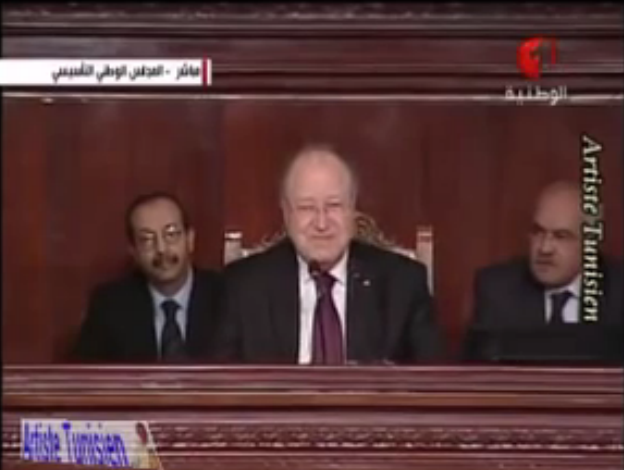National
Constituent Assembly president, Mostapha Ben Jaafar (Ettakattol, socialist) extends
his arms forward and invites the deputies with a "please vote".
- the Tunisian people, after decades of stiff dictatorship, does not have any parliamentary tradition nor a culture of debate, criticism and dialogue, so getting it right from the first shot was a divine mercy. Obviously, we did have a parliament, but it was as vocal as the walls of the assembly. An anecdotal, revealing example is the case of the "bread events" in 1984: when the then authoritarian president Habib Bourguiba ordered the lift of subsidy on bread, the parliament voted anonymously yes, when the same president ordered the re-establishment of the subsidy weeks later, the same parliament voted anonymously yes!
- dictators in this region kept telling us "it's either us or the islamists" and since it was very difficult to claim that dictatorship was good, it was easier to demonstrate that islamists were bad, hence the infinite waves of vilification. Unfortunately, this latter exercise was not too hard with all the horrors some islamist factions have committed. The western powers put their democratic values on hold and decided to support dictatorships all in the fear of the islamist threat. Therefore, when this constitution is produced under an islamist leadership (40% of the assembly seats) securing unprecedented civil and public rights for men and women, for believers and non-believers, it speaks volumes about the imposture entire nations lived in for decades and made them cheer bloody dictators. I am sure some of us have heard the famous "Islamists use democracy as a one-way street: when they reach power in election, they'll never relinquish it", so when the Islamist-led government in Tunisia willfully resigns to hand power to a non-partisan government in an answer to opposition mistrust around the upcoming elections, it certainly bewilders the likes of Daniel Pipes and David Horowitz.
- the security context is suffocating: our Libyan neighbours to the south are struggling with an armed chaos and a weak state. The police was despised as the strong arm of dictatorship with pandemic corruption and wide spread torture, so it struggled to provide effective security under the new democratic system. The military coup in Egypt emboldened the anti-revolutionary forces and gave them strong hopes that they can actually stop the transition to democracy. The general amnesty law passed weeks after the revolution have released hundreds of prisoners convicted under unfair trial conditions, however, some of those turned out to be dangerous terrorists for real. With the military incursion in Mali, some militants fled the combat zone and seem to have settled in the mountainous areas bordering Algeria. Needless to say that those were the most unwelcome guests causing dozen of casualties in confrontations with the security forces and two political assassinations.



ليست هناك تعليقات:
إرسال تعليق